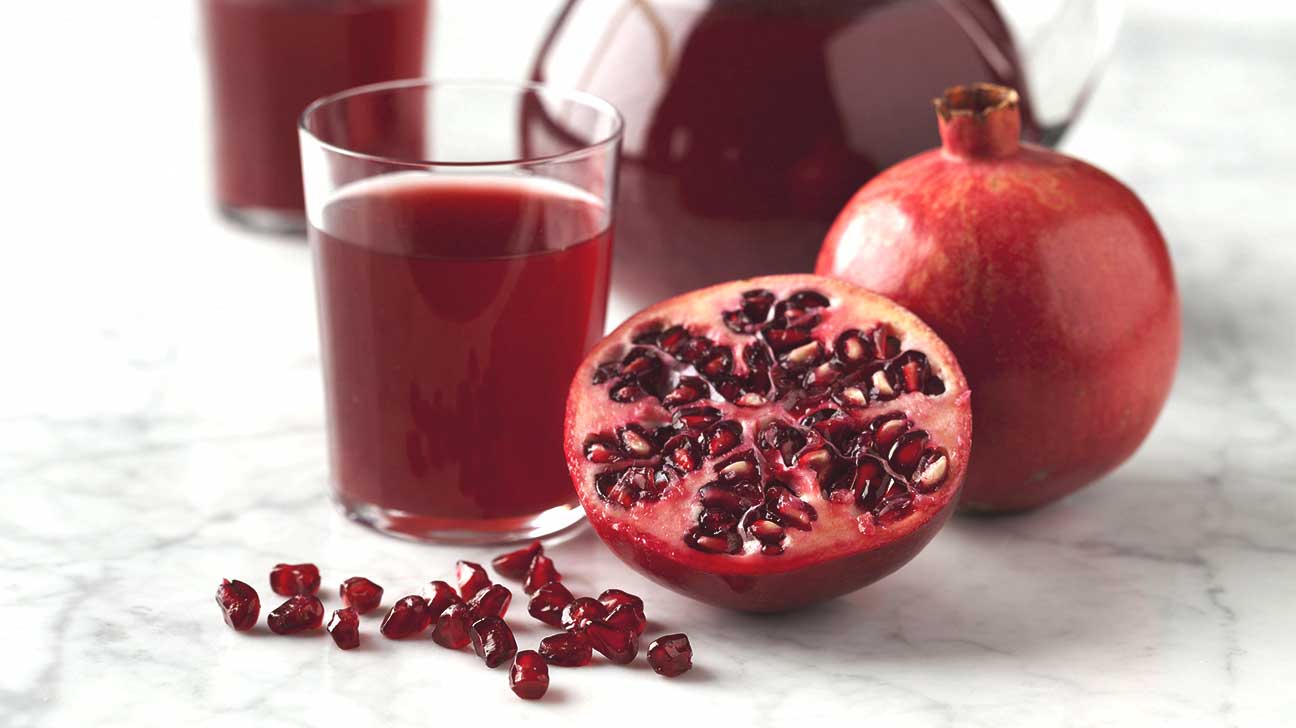Benefits of Pomegranate Juice: For Health
Medically Reviewed by Natalie Butler, RD, LD on November 15, 2016 — Written by Mandy Ferreira

Fresh
juice doesn’t have to be green or full of spinach to be healthy.
Pomegranate juice contains more than 100 phyto chemicals. The pomegranate
fruit has been used for thousands of years as medicine.
Today, pomegranate juice is being studied for its many health benefits. It may help with cancer prevention, immune support, and fertility.
Here are some of the potential benefits.
Pomegranate
seeds get their vibrant red hue from polyphenols. These chemicals are
powerful antioxidants. Pomegranate juice contains higher levels of
antioxidants than most other fruit juices. It also has three times more antioxidants
than red wine and green tea. The antioxidants in pomegranate juice can
help remove free radicals, protect cells from damage, and reduce
inflammation. Today, pomegranate juice is being studied for its many health benefits. It may help with cancer prevention, immune support, and fertility.
Here are some of the potential benefits.
The juice of a single pomegranate has more than 40 percent of your daily requirement of vitamin C. Vitamin C can be broken down when pasteurized, so opt for homemade or fresh pomegranate juice to get the most of the nutrient.
Pomegranate
juice recently made a splash when researchers found that it may help
stop the growth of prostate cancer cells. Despite multiple studies on
the effects of the juice on prostate cancer, results are still
preliminary.
While there haven’t been long-term studies with humans that prove that pomegranate juice prevents cancer or reduces the risk, adding it to your diet certainly can’t hurt. There have been encouraging results in studies so far, and bigger studies are now being done.
While there haven’t been long-term studies with humans that prove that pomegranate juice prevents cancer or reduces the risk, adding it to your diet certainly can’t hurt. There have been encouraging results in studies so far, and bigger studies are now being done.
4. Alzheimer’s disease protection
The
antioxidants in the juice and their high concentration are believed to
stall the progress of Alzheimer disease and protect memory.
Digestion
Pomegranate
juice can reduce inflammation in the gut and improve digestion. It may
be beneficial for people with Crohn’s disease, ulcerative colitis, and
other inflammatory bowel diseases.
While there are conflicting beliefs and research on whether pomegranate juice helps or worsens diarrhea, most doctors recommend avoiding it until you are feeling better and your symptoms have subsided.
While there are conflicting beliefs and research on whether pomegranate juice helps or worsens diarrhea, most doctors recommend avoiding it until you are feeling better and your symptoms have subsided.
Anti-inflammatory
Pomegranate
juice is a powerful anti-inflammatory because of its high concentration
of antioxidants. It can help reduce inflammation throughout the body
and prevent oxidative stress and damage. Flavonols in pomegranate juice may help block the inflammation that contributes to osteoarthritis and cartilage damage. The juice is currently being studied for its potential effects on osteoporosis, rheumatoid arthritis, and other types of arthritis and joint inflammation.
Pomegranate juice is in the running as the most heart-healthy juice. It appears to protect the heart and arteries. Small studies have shown that the juice improves blood flow and keeps the arteries from becoming stiff and thick. It may also slow the growth of plaque and buildup of cholesterol in the arteries. But pomegranate may react negatively with blood pressure and cholesterol medications like statins. Be sure to talk with your doctor before indulging in the juice or taking a pomegranate extract supplement.
Drinking pomegranate juice daily may also help lower systolic blood pressure. But more studies need to be done to determine if pomegranate juice can decrease overall blood pressure in the long term.
Between the vitamin C and other immune-boosting nutrients like vitamin E, pomegranate juice can prevent illness and fight off infection. Pomegranates have also been shown to be antibacterial and antiviral in lab tests. They are being studied for their effects on common infections and viruses.
In addition to vitamin C and vitamin E, pomegranate juice is a good source of folate, potassium, and vitamin K.
Drinking 8 ounces of pomegranate juice a daily may improve learning and memory, according to a recent study. Pomegranate juice’s concentration of antioxidants and ability to impact oxidative stress make it a potential fertility aid. Oxidative stress has been shown to cause sperm dysfunction and decrease fertility in women. The juice has also been shown to help reduce oxidative stress in the placenta. But researchers don’t yet know the exact benefits this may provide. Drinking pomegranate juice can also increase testosterone levels in men and women, one of the main hormones behind sex drive.
Move over, tart cherry and beet juice. Pomegranate juice may be the new sport performance enhancer. The juice may help reduce soreness and improve strength recovery. It also decreases oxidative damage caused by exercise.
Pomegranate was traditionally used as a remedy for diabetes in the Middle East and India. While much is still unknown about the effects of pomegranate on diabetes, it may help decrease insulin resistance and lower blood sugar.
Bottom line
Green
juice isn’t the only healthy option out there. Adding pomegranate juice
to your diet may reduce your risk for chronic disease and inflammation.
It’s also a great way to get the fruit’s nutrients and a boost of
antioxidants.
It’s best to check with your doctor before drinking pomegranate juice every day, to make sure it won’t interfere with any of your medications.
It’s best to check with your doctor before drinking pomegranate juice every day, to make sure it won’t interfere with any of your medications.
